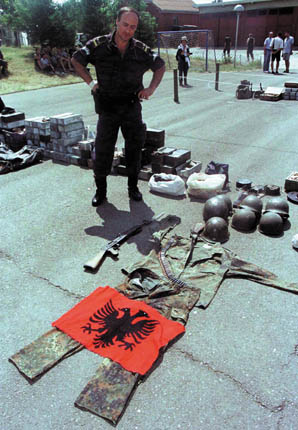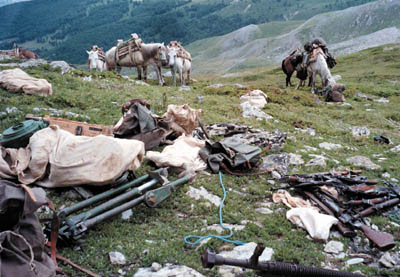![]()
 |
Terrorism in Kosovo - Metohija In Kosovo-Metohija classic
terrorism pursued by the so-called Kosovo Liberation Army
is at work. Terrorist activities are carried out in the
style of Europe's and the world's well-known terrorist
organizations - attacks are carried out regularly,
escalating when a peaceful political solution is near at
hand, the terrorists openly take responsibility for
destructive actions and killings, calls are made for mass
resistance and terrorist activities carried out in
neighboring countries as well. |
Only during 1998, when terrorism in Kosovo-Metohija escalated, all Serbs and Montenegrins were expelled from another 87 villages. Persecution, intimidation and murders of the non-Albanian population as well as reprisals against members of their own nationality who are loyal to the state where they live and work, and against all those who show the slightest wish for talks with the Serb side, are characteristic of the activities of the Kosovo Liberation Army. The measures of the authorities against the terrorists represent legal reaction to increasingly arrogant attacks and acts of provocation and are strictly within the framework of the law and the powers invested in the responsible bodies and are aimed at protecting all citizens, their property, public peace and order, freedom of movement, circulation of traffic and operation of public offices. Apart from activities in Kosovo-Metohija, armed border violations and provocative actions from the territory of Albania have also increased abreast with intensification of efforts to promote a peaceful solution through dialogue. Included in the arming, recruiting and training of terrorists are officers of the Albanian armed forces, while their instructors are also terrorists drawn from certain Middle East countries. The official authorities in Albania not only are not taking any measures to prevent serious violations of the Yugoslav border, endangering of the sovereignty and territorial integrity of the Federal Republic of Yugoslavia, which is their international obligation under UN Security Council resolutions, but they are openly encouraging separatism and terrorism in Kosovo-Metohija aimed at creating a so-called Greater Albania using the territories of neighboring countries. Most arms used by the Albanian terrorists in Kosovo-Metohija originate from Albania. The smuggling of weapons for terrorists into Kosovo-Metohija is directly linked to drug trafficking and organized international crime in general which also includes money laundering, white slavery, prostitution, especially juvenile, etc. Attesting to the links between international crime and terrorism in Kosovo are also statements by government officials of many European countries, Interpol, Europol and world media reports. |
INCIDENTS ON THE YUGOSLAV-ALBANIAN BORDER
 |
Ever since Albania has existed as a state, the situation on the Yugoslav-Albanian border has been almost always tense, attesting to which is a large number of border incidents, unscrupulous provocations and armed clashes with serious consequences.We carry excerpts from the article. After World War II, during the years-long rule of Enver Hoxha and Ramic Alija in Albania, up to three thousand illegal immigrants would be caught on the territory of Yugoslavia, and the number of border incidents and various kinds of provocation ranged between 50 and 70 annually. |
When
Sali Berisha came to power in May 1992, the situation on
the state border became increasingly tense, and border
incidents acquired the form of an open aggression. Under
Berisha's influence, the Albanian Parliament passed a
decision on recognizing the self-proclaimed so-called
Republic of Kosovo in 1992, proclaiming the state border
between the FR Yugoslavia and Albania a "Berlin
Wall", which, as he put it, had to be pulled down at
any cost. "The liberation of Kosovo", as it is
referred to in Albania, is the goal put before all
Albanians, whereas Albania becomes a base for arms
smuggling and the training of terrorists which are then
illegally sent to Kosovo. In the first year of Sali
Berisha's rule, 142 border incidents were registered. The arrival of the
OSCE Verification Mission in Kosovo-Metohija, seems to
have had a negative impact on the situation in the
southern Serbian province and the Yugoslav-Albanian
border. Attesting to this are constant attempts at
infiltrating armed groups from Albania into Yugoslav
territory, daily attacks on the police, as well as the
killing and abduction of civilians throughout
Kosovo-Metohija. Members of the OSCE Verification Mission in Kosovo-Metohija participate, in all cases of armed clashes, in on-site investigations, regularly assessing that in question are serious border incidents. However, no one from international institutions has so far either condemned or threatened Albania for having turned its territory into a centre for training, organizing and arming terrorists, and for the fact that Yugoslavia is openly attacked from its territory almost every day. |
TERRORISM AND THE NARCO MAFIA IN KOSOVO-METOHIJA
|
Copyright (C.) RJ